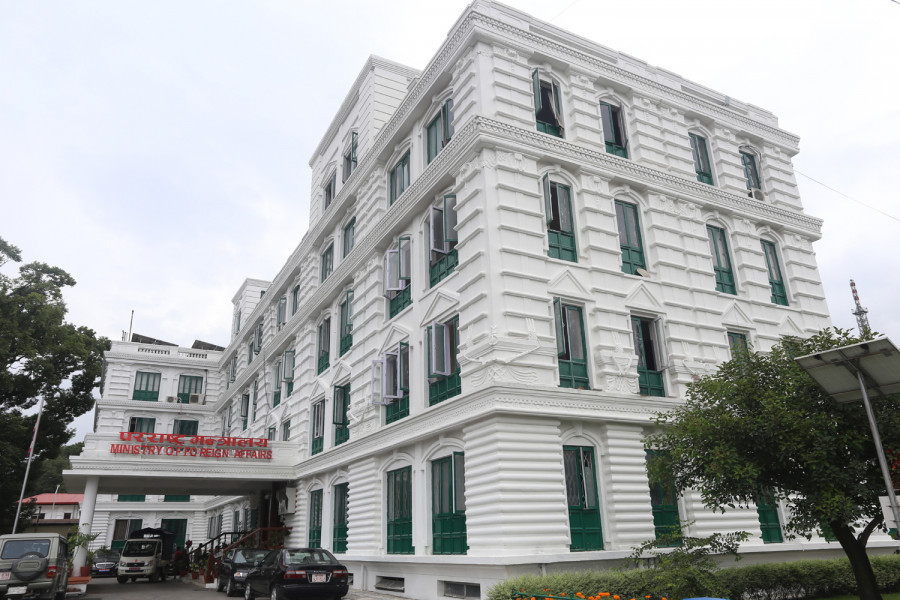National
Foreign Ministry working to revise and reactivate diplomatic code of conduct
Officials say the plan to introduce the code at the earliest has been necessitated by criticism over meetings between politicians and foreign diplomats without the ministry’s knowledge.
Anil Giri
Amid criticism for its failure to monitor the frequent meetings between the political leadership and foreign diplomats, the Ministry of Foreign Affairs is once again working to revise and reactivate its diplomatic code of conduct.
The need for such a code comes amidst the increasing meetings of foreign envoys with the leadership of various political parties, and even the President, to which the Foreign Ministry is by and large oblivious.
“We are working to update and reissue the diplomatic code of conduct by bringing political party leaders under its purview so that there is accountability,” Foreign Minister Pradeep Gyawali told the Post.
A latest version of such a code was prepared in 2015 but it has been gathering dust at the Prime Minister’s Office and the Foreign Ministry.
This was while Nepal was undergoing a political transition and preparing a new federal republican constitution, and foreign diplomats were frequently holding meetings with political leaders and the President.
The Ministry of Foreign Affairs has dispatched seven section officers to all the seven provinces to ensure that chief ministers, ministers and officials abide by the diplomatic code while meeting with foreign dignitaries.
The code was applicable to all top politicians from the President to party leaders to parliamentarians, constitutional bodies’ office bearers, officials above the under-secretary level and officials of security agencies, among others.
The basic principle of the code was to ensure that official meetings, contacts, negotiations and communications of the government of Nepal with foreign governments, international organisations, their representatives and other officials are consistent with diplomatic norms and international practices.
As soon as he took charge of the Foreign Ministry, Gyawali had said besides strengthening bilateral and multilateral ties, his focus would be on strictly implementing the code of conduct. But he failed to pursue it as a priority.
After the meeting between President Bidya Devi Bhandari and Chinese Ambassador to Nepal Hou Yanqi during the height of the crisis within the governing Nepal Communist Party (NCP) drew criticism for violating the code of conduct, the ministry is waking up, according to a joint-secretary at Foreign Ministry who spoke on condition of anonymity.
Besides the President, the Chinese ambassador had also met ruling party leaders including Prime Minister KP Sharma Oli, former prime ministers Pushpa Kamal Dahal, Madhav Kumar Nepal and Jhala Nath Khanal. The meetings had become a talking point and gathered criticism.
The envoy had met them in the end of April and again in the first week of July.
Similarly, before leaving for New Delhi for consultations with senior officials of the Indian Ministry of External Affairs, Indian Ambassador to Nepal Vinay Mohan Kwatra also held a series of meetings with ruling party leaders, according to another official at the Foreign Ministry who also spoke on condition of anonymity.
“There are also concerns about the ministry’s inability to monitor the meetings of top leaders with foreign leaders and dignitaries and leaders have not been pressed enough to send the minutes of such meetings,” the official told the Post.
According to experts on foreign relations and diplomats, countries across the world, especially democratic countries, maintain a robust diplomatic code of conduct.
“When foreign diplomats meet with leaders, several important issues related to national security, national interest or other sensitive matters might come up and these important conversations should be in the knowledge of the Foreign Ministry,” said Dinesh Bhattarai, who served as foreign relations adviser to the late prime minister Sushil Koirala. “As far as I know, it went well for some years but it takes some time to build the system. After successive governments failed to follow it properly, it was forgotten.”
In 2011, when Upendra Yadav was the foreing minister, he had introduced a fresh set of guidelines.
“I thought of introducing the diplomatic code because I thought it was necessary for Nepal,” Yadav told the Post.
The code of conduct went for a revision in 2014-15 after some ministers of then Koirala-led government proposed that political party leaders be exempted from its purview.
In 2016, then foreign minister Kamal Thapa decided to revisit the code of conduct with a view to implementing it. But that did not materialise. Later Prakash Sharan Mahat and Krishna Bahadur Mahara as foreing ministers also attempted to revise it, but without success, largely due to the change of guard.
“We have a stable and powerful government today and I hope it strongly pursues the diplomatic code of conduct,” Bhim Rawal, a senior leader of the ruling communist party, told the Post. “I have been demanding this for a long time, within the party, from Parliament and several other platforms.”
According to the foreign ministry official, the responsibility of following the code of conduct begins from top government officials who are the first to violate it.
No prime minister, foreign minister or other minister since 2011 has followed the code of conduct.
“In line with the federal set-up Nepal adopted after the 2015 constiution and 2017 elections for the three tiers of government, we felt the need for a new code that would incorporate provincial and local bodies as well,” said Gyawali.
According to officials, the revised draft stresses that the meetings of the heads of political parties, prime minister, ministers and former prime ministers with foreign diplomats and visiting officials should be arranged through the Foreign Ministry and that it should assign a note-taker for such meetings.
In case any official from the ministry fails to attend such meetings, the leaders would have to file the details of the interaction to the ministry.
“In a communist party, it is very important to follow the diplomatic decorum,” said Rawal. “But if we fail to do so, it means we are inviting interference.”




 8.22°C Kathmandu
8.22°C Kathmandu














